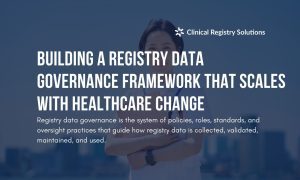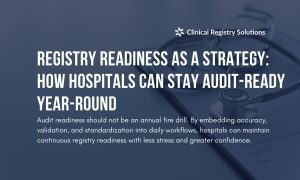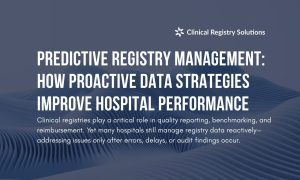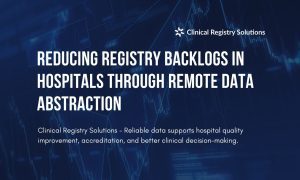Have you ever wondered what happens to all the notes and reports doctors write during your visits? How do hospitals and clinics keep track of your care over time? The answer lies in abstract medical records — concise summaries that capture the most important details of your health history. In this blog, we’ll explore what medical record abstraction is, why it’s essential, and how it helps healthcare providers, researchers, and patients alike.
What Does “Abstracting Medical Records” Mean?
Abstracting medical records means creating a brief summary of a patient’s medical history. Instead of reading through hundreds of pages of detailed notes, healthcare workers can quickly understand your condition, treatments, and progress by reviewing these summaries.
These abstracts include key information like diagnoses, surgeries, test results, medications, and hospital visits. They save time, help doctors provide faster care, and make it easier when switching providers or going to a new hospital.
What Does “Abstract” Mean in Medical Terms?
In medicine, to “abstract” something means to extract the most important details — similar to highlighting main points in a book. This focused information helps doctors, nurses, and researchers concentrate on what truly matters for patient care or scientific study.
What Is Clinical Data Abstraction?
Clinical data abstraction is the process of pulling key data from medical records and organizing it into a structured, readable format. Hospitals use this data to measure how well they are treating patients, improve quality, and meet health goals.
Trained professionals called clinical data abstractors perform this task, carefully identifying and summarizing the most relevant information.
What Is Included in Abstract Medical Records?
Typically, abstract medical records include:
- Patient’s name, age, and gender
- Diagnoses and reasons for visits
- Test results (e.g., X-rays, blood work)
- Medications prescribed
- Treatments and procedures given
- Hospital stay details
- Discharge instructions
These summaries help healthcare providers quickly make informed decisions without digging through lengthy records.
What Do Abstractors Do?
Abstractors are skilled professionals who:
- Review detailed patient records
- Extract the most important data
- Enter that data into organized systems or reports
- Ensure accuracy and compliance with regulations
They work in hospitals, clinics, insurance companies, and research teams, helping improve patient safety and healthcare quality.
How Is Data Abstracted from Medical Records?
The process usually involves:
- Understanding the purpose: Is the data for treatment, research, or billing?
- Selecting sources: Patient charts, test results, doctor’s notes
- Picking key data: Focus on diagnoses, dates, treatments
- Using coding systems: For example, ICD-10 codes
- Recording the data: Securely entering it into a system
Privacy and accuracy are crucial throughout this process.
Why Is Medical Record Abstraction Important?
- Improves Patient Care
Doctors get the information they need quickly, enabling better and faster decisions. - Saves Time
Instead of reading full records, care teams glance at summaries to act promptly. - Supports Research
Researchers study trends and treatment effectiveness using abstracted data. - Tracks Hospital Performance
Hospitals monitor outcomes and improve quality based on abstracted information. - Facilitates Insurance and Billing
Insurance companies use summaries to verify claims efficiently.
Common Uses of Abstract Medical Records
- Quality assurance in hospitals
- Reporting to government health agencies
- Insurance claims processing
- Tracking patient progress over time
- Supporting public health research
Benefits of Accurate Medical Record Abstraction
- Reduces errors in care delivery
- Builds trust between patients and providers
- Speeds up billing and insurance approvals
- Helps public health officials plan better
- Keeps healthcare systems organized and efficient
Quick Comparison Table
| Process | Description | Typical Users |
| Medical Record Abstraction | Summarizing patient info from full records | Hospitals, clinics |
| Clinical Data Abstraction | Organizing health data for reports/research | Research teams, hospitals |
| Clinical Data Abstractor | Expert who performs abstraction | Hospitals, insurers |
Final Thoughts
Medical record abstraction may happen behind the scenes, but its impact is clear: faster, better care and smarter research. Proper data abstraction helps healthcare providers respond quickly and deliver the highest quality service.
Healthcare providers: Improve your service through clinical data abstraction.
Patients: Your records are carefully handled to ensure you receive the best possible care.
If you want to learn more or need expert help with medical record abstraction, reach out to the team at Clinical Registry Solutions today.
FAQs About Medical Record Abstraction
Q: What is included in abstracting medical records?
A: Key patient details such as diagnoses, treatments, tests, and medications summarized from full records.
Q: What do abstractors do in healthcare?
A: They review medical records and extract important data for use in care, research, and billing.
Q: Why is medical record abstraction necessary?
A: It improves patient care, saves time, supports research, and streamlines billing.
Q: What is the difference between clinical data abstraction and medical record abstraction?
A: Medical record abstraction summarizes patient info; clinical data abstraction organizes and analyzes data for reporting and research.
Q: How do I become a clinical data abstractor?
A: Training typically involves healthcare knowledge, coding certifications, and hands-on experience.





